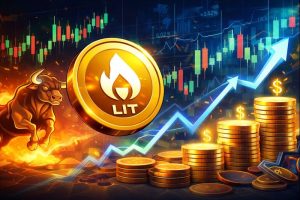The true innovation behind Bitcoin is the ability to transact value instantly around the world.
Saifedean Ammous and Peter St. Onge, in my opinion, are the thought leaders on the macroeconomic effects of adopting a bitcoin standard. The Austrian school of economics tends to shy away from making specific predictions and rather focuses on theory and grand outcomes. Mainstream fiat economists, who do tend to make these predictions — which are consistently inaccurate — don’t understand bitcoin or its value proposition and thus only produce cringe-inducing views such as this.
This leaves a gleaming gap of confusion and uncertainty about what will happen as the world transitions from using fiat currency to adopting bitcoin.
This article will try to fill in that gap, to sketch a picture for the reader of what is possible and what is probable for our economic future on Earth.
I am not of the opinion that there is a major depression looming or that the world economy will at some point “collapse,” but I rather envision a long period of transition, or realignment. There already exists a parallel economy of people living and transacting only in bitcoin. This bitcoin economy will grow while the “fiat economy” will gradually become smaller as time passes and people transition.
Bitcoin adoption will be brought about not by the public choosing to pay with bitcoin, but rather by producers and sellers preferring to be paid in bitcoin and thus incentivising customers to use it. Expect to see discounts for paying in bitcoin and sellers accepting only bitcoin.
This is not to say that there will not be turmoil. The fiat system has injected (2008) and re-injected (2020) the world economy with cheap money, causing malinvestment. At some point, there will be a large correction, or corrections — a “market crash.”. When this will happen is impossible to predict. According to Austrian Business Cycle Theory, the longer it takes for the correction to occur, the more capital is malinvested and the more drastic the correction will be.
This will not draw a large part of the economy into bitcoin immediately. The BTC price might even initially fall as everyone panic sells everything. Central banks and governments will not simply roll over and submit defeat. There will be more money printing, stricter laws and higher tax rates, etc.
Hyperinflation will occur in some areas, but remember that bitcoin is right there to be used as a medium of exchange, store of value and unit of account. Weimar Germany and Zimbabwe did not have this luxury. They had to go back to a barter system and this is what decimated their economy as everything came to a standstill. Venezuela appears to be slowly getting into bitcoin and things there seem to have gone better than originally anticipated. They also didn’t have a functioning bitcoin Lightning Network, which we already have today.
Some jurisdictions will choose to “ban,” outlaw, or heavily tax bitcoin, making it harder but not impossible for people in such a jurisdiction to transact in it. Productive people will slowly move from those areas to the areas that freely accept or embrace bitcoin, and these areas will flourish. Eventually, the areas who chose to go against bitcoin adoption will either have to start accepting it, or be turned into an unproductive wasteland as they are outperformed by the rest of the world. Imagine a region such as the U.S.S.R. eventually having to submit to a form of capitalism.
As has been happening for the last 10 years, whoever chooses to adopt the bitcoin standard earlier, will be wealthier compared to later adopters. This will become more evident as time passes. There will be individuals and institutions who refuse adoption for decades, eventually living in non-bitcoin enclaves.
The transfer of wealth will be significant, but probably not as spectacular as many bitcoin maximalists imagine. Real wealth is kept in assets, such as property, machinery, knowledge, goods, resources. Bitcoin adoption will not destroy this wealth; the prices of these will simply be denominated in bitcoin instead of fiat. This includes stocks.
Companies and industries that produce real-world value will flourish, such as The mining, manufacturing, technology, distribution, retail, etc, industries. Their share prices will take a hit when the correction(s) happen, but this has nothing to do with bitcoin. At this stage markets are overvalued when compared to historical data, and prices should readjust in the future.
Banking
One sector that will go through a massive transformation is banking. It is worth taking a closer look at what could happen in this space under a Bbitcoin standard.
It would be fair to argue that banking will be reduced to what it was under the gold standard. Banking is simply a dignified form of money lending, the banker having the advantage that the money which he lends is not his own but other peoples’. It has been deposited with him for the sake of interest that he pays on it. The banker’s business is to lend this money out again at higher rates of interest than he pays for it, pocketing the difference as a reward.
Banks perform an important and significant role in society. It is through their agency that capital is transferred from those who cannot or will not employ it in industry, to those who can. In this way, a banker increases not the total amount of capital in existence, but the total amount available for production. This is an important service for which the bank deserves to be paid.
Under a bitcoin standard, the income and value of banks will be largely reduced to whatever the market will be willing to pay for the above-mentioned service. Note that under the gold standard, the public paid a fee to the bank for the “safekeeping” of their capital. Because it is safer for an individual to secure her bitcoin herself rather than entrust it to a third party, banks — or whoever will perform the capital distribution function — will have to incentivise depositors in order to obtain their bitcoin deposits.
Who knows what novel capital distribution methods the free market will come up with when innovators are allowed to innovate in this space?
Whatever happens, in the long run, banking stocks will inevitably lose value in real terms as the space they are practising in with their regulation-laden oligarchies becomes smaller. Some banks may innovate and thrive — the free market might even allow for some form of fractional reserve bitcoin banking if the risk appetite exists. But under the bitcoin standard, there will not be free money being handed out to the connected few.
Value, Interest Rates, Inflation And Deflation
Disclosure: I adhere to the Misesian view which follows that inflation is the increase in total money supply in the economy. Deflation would be the decrease in money supply. If the total money supply in an economy is suddenly reduced from previous levels, I wholly agree that this could and probably always will have devastating effects. This phenomenon should not be confused with a monetary unit’s increase in value when compared to economic goods, which is also termed “deflation,” but will have many positive effects on the economy and on society.
Let’s assume for a second it is the year 2035 and bitcoin is the world’s most widely-used currency. What could we expect inflation and interest rates to be?
Total value or market cap of bitcoin: I have zero doubt that BTC will eventually reach $10 million per coin. The problem is that at that stage a coffee might cost $5000, as the value of the U.S. dollar would be close to zero in today’s terms. Thus, calculating the value of bitcoin in terms of future U.S. dollar prices is a futile exercise. Yes, when measured in U.S. dollars, bitcoin’s potential value really is ∞/21m.
Predicting what the purchasing power of bitcoin against goods and services would be, and expressing that as a number in terms of U.S. dollar value today, is a far more complex and debatable topic,on which you will break your brain many times over trying to solve. I will attempt to discuss this in a future article.
Once the price of bitcoin stabilizes and is widely used as the world’s premier unit of account, a period of semi-permanent deflation (in bitcoin terms) will set in. That is, the value of your currency will appreciate when compared to goods and services. This will happen not because the total amount of currency is reduced but because the total amount of purchasable goods will increase compared to the total amount of currency in existence, and also because of technological advances that will cause goods to become more affordable. It is important to note that this is and was the natural state of the world, before governments and banks started to f*ck with your money.
Interest rates will be determined by the free market. Whatever rate a lender and borrower agree upon will be the rate paid.
Interest rates can be viewed as the cost of capital. On the free market, this has historically been between 3% and 6% per year. How does this all fit in with the deflation though? Let’s assume an entrepreneur in the future wants to borrow bitcoin for a new project. He will find a willing lender — probably through DeFi or some form of a bank — and borrow the bitcoin at an agreed-upon interest rate. Let’s say it’s 4%. If the entrepreneur expects that deflation will take place during the period of the loan, he will simply add the expected deflation to his cost of capital calculation.
Interest rate: 4%
Expected Deflation: 2%
Total cost of capital per annum: 6%
This will not decentivise the economy from growing or entrepreneurs from borrowing. Under the fiat standard, we have seen interest rates go up to 15% or much higher in some places, even when deducting the rate of inflation.
What will be drastically reduced is the fee that the middle man takes for arranging the loan, as discussed before. This is what we know today as the difference between the repo and prime rates. On a free market, whoever offers the lowest “fee” for arranging the transaction will outcompete the others, and with modern technology, this fee should be negligible.
Under a bitcoin standard and with modern innovation, the distribution of capital would be much more efficient, as someone in Africa for example, would be able to borrow from someone in Europe or the U.S.A. at the same rate as others. This will cause world-wide competition for capital and whoever is most efficient in allocating that capital will thrive.
This brings me to what I consider the single most beneficial aspect which a bitcoin standard brings to the world. Enabling free trade between those who choose to use it. The very fact that two parties choose to trade with each other willingly, implies that both parties benefit from the transaction. The more such trade happens, the better off everyone involved is. Being able to easily, instantly and cheaply pay anyone around the globe will enable more trade to take place, especially on the ground level for people who were previously unbanked.
I hope that reading this has opened your mind to the possibility of a prosperous and peaceful transition to the bitcoin standard. In the long run, the natural laws of society and economics will play out. What works and what does not work for society will become more and more evident.
May the best currency win.
This is a guest post by Handre van Heerden. Opinions expressed are entirely their own and do not necessarily reflect those of BTC Inc. or Bitcoin Magazine.





















